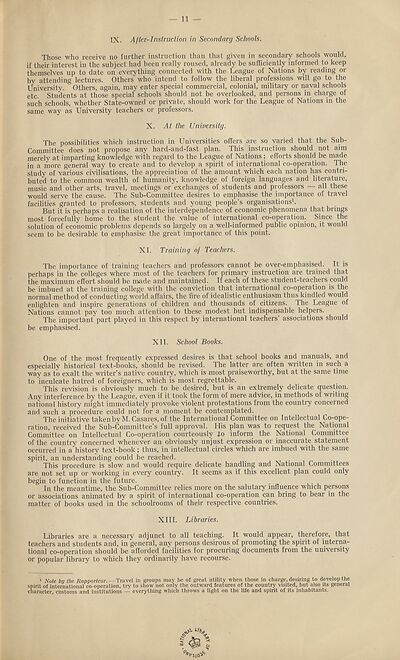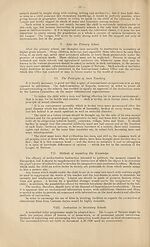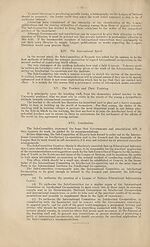Download files
Complete book:
Individual page:
Thumbnail gallery: Grid view | List view

— 11 —
IX. After-Instruction in Secondary Schools.
Those who receive no further instruction than that given in secondary schools would,
if their interest in the subject had been really roused, already be sufficiently informed to keep
themselves up to date on everything connected with the League of Nations by reading or
by attending lectures. Others who intend to follow the liberal professions will go to the
University. Others, again, may enter special commercial, colonial, military or naval schools
etc. Students at those special schools should not be overlooked, and persons in charge of
such schools, whether State-owned or private, should work for the League of Nations in the
same way as University teachers or professors.
X. At the University.
The possibilities which instruction in Universities offers are so varied that the Sub-
Committee does not propose any hard-and-fast plan. This instruction should not aim
merely at imparting knowledge with regard to the League of Nations ; efforts should be made
in a more general way to create and to develop a spirit of international co-operation. The
study of various civilisations, the appreciation of the amount which each nation has contri¬
buted to the common wealth of humanity, knowledge of foreign languages and literature,
music and other arts, travel, meetings or exchanges of students and professors — all these
would serve the cause. The Sub-Committee desires to emphasise the importance of travel
facilities granted to professors, students and young people’s organisations1.
But it is perhaps a realisation of the interdependence of economic phenomena that brings
most forcefully home to the student the value of international co-operation. Since the
solution of economic problems depends so largely on a well-informed public opinion, it would
seem to be desirable to emphasise the great importance of this point.
XL Training of Teachers.
The importance of training teachers and professors cannot be over-emphasised. It is
perhaps in the colleges where most of the teachers for primary instruction are trained that
the maximum effort should be made and maintained. If each of these student-teachers could
be imbued at the training college with the conviction that international co-operation is the
normal method of conducting world affairs, the fire of idealistic enthusiasm thus kindled would
enlighten and inspire generations of children and thousands of citizens. The League of
Nations cannot pay too much attention to these modest but indispensable helpers.
The important part played in this respect by international teachers’ associations should
be emphasised.
XII. School Books.
One of the most frequently expressed desires is that school books and manuals, and
especially historical text-books, should be revised. I he latter are often written in such a
way as to exalt the writer’s native country, which is most praiseworthy, but at the same time
to inculcate hatred of foreigners, which is most regrettable.
This revision is obviously much to be desired, but is an extremely delicate question.
Any interference by the League, even if it took the form of mere advice, in methods of wiiting
national history might immediately provoke violent protestations from the country concerned
and such a procedure could not for a moment be contemplated.
The initiative takenby M. Casares, of the International Committee on Intellectual Co-ope¬
ration, received the Sub-Committee’s full approval. His plan was to request the National
Committee on Intellectual Co-operation courteously to inform the National Committee
of the country concerned whenever an obviously unjust expression or inaccurate statement
occurred in a history text-book; thus, in intellectual circles which are imbued with the same
spirit, an understanding could be reached.
This procedure is slow and would require delicate handling and National Committees
are not set up or working in every country. It seems as if this excellent plan could only
begin to function in the future.
In the meantime, the Sub-Committee relies more on the salutary influence which persons
or associations animated by a spirit of international co-operation can bring to bear in the
matter of books used in the schoolrooms of their respective countries.
XIII. Libraries.
Libraries are a necessary adjunct to all teaching. It would appear, therefore, that
teachers and students and, in general, any persons desirous of promoting the spirit of interna¬
tional co-operation should be afforded facilities for procuring documents from the university
or popular library to which they ordinarily have recourse.
1 Note bii the Rapporteur. — Travel in groups may be of great utility when those in charge, desiring to develop the
spirit of international co-operation, try to show not only the outward features of the country visited, but also its general
character, customs and institutions — everything which throws a light on the life and spirit of its inhabitants.
IX. After-Instruction in Secondary Schools.
Those who receive no further instruction than that given in secondary schools would,
if their interest in the subject had been really roused, already be sufficiently informed to keep
themselves up to date on everything connected with the League of Nations by reading or
by attending lectures. Others who intend to follow the liberal professions will go to the
University. Others, again, may enter special commercial, colonial, military or naval schools
etc. Students at those special schools should not be overlooked, and persons in charge of
such schools, whether State-owned or private, should work for the League of Nations in the
same way as University teachers or professors.
X. At the University.
The possibilities which instruction in Universities offers are so varied that the Sub-
Committee does not propose any hard-and-fast plan. This instruction should not aim
merely at imparting knowledge with regard to the League of Nations ; efforts should be made
in a more general way to create and to develop a spirit of international co-operation. The
study of various civilisations, the appreciation of the amount which each nation has contri¬
buted to the common wealth of humanity, knowledge of foreign languages and literature,
music and other arts, travel, meetings or exchanges of students and professors — all these
would serve the cause. The Sub-Committee desires to emphasise the importance of travel
facilities granted to professors, students and young people’s organisations1.
But it is perhaps a realisation of the interdependence of economic phenomena that brings
most forcefully home to the student the value of international co-operation. Since the
solution of economic problems depends so largely on a well-informed public opinion, it would
seem to be desirable to emphasise the great importance of this point.
XL Training of Teachers.
The importance of training teachers and professors cannot be over-emphasised. It is
perhaps in the colleges where most of the teachers for primary instruction are trained that
the maximum effort should be made and maintained. If each of these student-teachers could
be imbued at the training college with the conviction that international co-operation is the
normal method of conducting world affairs, the fire of idealistic enthusiasm thus kindled would
enlighten and inspire generations of children and thousands of citizens. The League of
Nations cannot pay too much attention to these modest but indispensable helpers.
The important part played in this respect by international teachers’ associations should
be emphasised.
XII. School Books.
One of the most frequently expressed desires is that school books and manuals, and
especially historical text-books, should be revised. I he latter are often written in such a
way as to exalt the writer’s native country, which is most praiseworthy, but at the same time
to inculcate hatred of foreigners, which is most regrettable.
This revision is obviously much to be desired, but is an extremely delicate question.
Any interference by the League, even if it took the form of mere advice, in methods of wiiting
national history might immediately provoke violent protestations from the country concerned
and such a procedure could not for a moment be contemplated.
The initiative takenby M. Casares, of the International Committee on Intellectual Co-ope¬
ration, received the Sub-Committee’s full approval. His plan was to request the National
Committee on Intellectual Co-operation courteously to inform the National Committee
of the country concerned whenever an obviously unjust expression or inaccurate statement
occurred in a history text-book; thus, in intellectual circles which are imbued with the same
spirit, an understanding could be reached.
This procedure is slow and would require delicate handling and National Committees
are not set up or working in every country. It seems as if this excellent plan could only
begin to function in the future.
In the meantime, the Sub-Committee relies more on the salutary influence which persons
or associations animated by a spirit of international co-operation can bring to bear in the
matter of books used in the schoolrooms of their respective countries.
XIII. Libraries.
Libraries are a necessary adjunct to all teaching. It would appear, therefore, that
teachers and students and, in general, any persons desirous of promoting the spirit of interna¬
tional co-operation should be afforded facilities for procuring documents from the university
or popular library to which they ordinarily have recourse.
1 Note bii the Rapporteur. — Travel in groups may be of great utility when those in charge, desiring to develop the
spirit of international co-operation, try to show not only the outward features of the country visited, but also its general
character, customs and institutions — everything which throws a light on the life and spirit of its inhabitants.
Set display mode to:
![]() Universal Viewer |
Universal Viewer | ![]() Mirador |
Large image | Transcription
Mirador |
Large image | Transcription
Images and transcriptions on this page, including medium image downloads, may be used under the Creative Commons Attribution 4.0 International Licence unless otherwise stated. ![]()
| League of Nations > International > International committee on intellectual co-operation > (11) |
|---|
| Permanent URL | https://digital.nls.uk/195219398 |
|---|
| Shelfmark | LN.XII |
|---|
| Description | Over 1,200 documents from the non-political organs of the League of Nations that dealt with health, disarmament, economic and financial matters for the duration of the League (1919-1945). Also online are statistical bulletins, essential facts, and an overview of the League by the first Secretary General, Sir Eric Drummond. These items are part of the Official Publications collection at the National Library of Scotland. |
|---|---|
| Additional NLS resources: |
|

